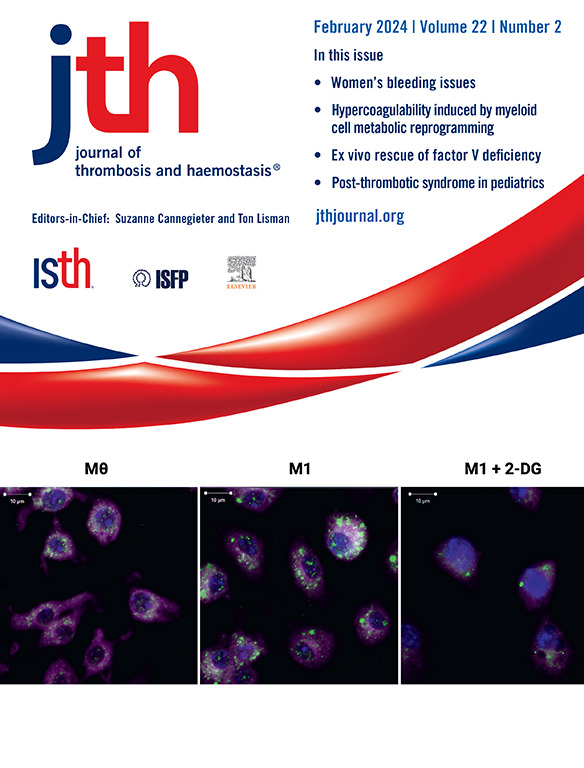The role of autophagy-related markers Beclin-1, LC3, and P62 in the pathogenesis of immune thrombocytopenia in children
IF 5
2区 医学
Q1 HEMATOLOGY
引用次数: 0
Abstract
Background
Immune thrombocytopenic purpura (ITP) is an autoimmune disorder in which thrombocytopenia results from antiplatelet autoantibody-mediated destruction and/or suppression of platelet production. Autophagy also plays an important role in the regulation of the innate and adaptive immune systems, and when autophagy becomes inefficient, it may lead to diverse autoimmune diseases.
Objectives
We aimed to assess autophagy-related markers Beclin-1, LC3, and P62 expression in ITP and to investigate the relation between autophagy markers and antiplatelet autoantibodies in pediatric ITP.
Methods
Gene expressions of Beclin-1, LC3, and P62 messenger RNA were assessed by quantitative real-time polymerase chain reaction in 30 children diagnosed with ITP and 20 healthy controls.
Results
The results showed that the relative gene expression of both Beclin-1 and LC3 genes was significantly increased in ITP patients compared with the control group, while P62 relative gene expression was significantly decreased in ITP patients compared with the control group. The relative gene expression of Beclin-1 and LC3 was significantly increased in ITP patients with positive antiplatelet antibodies compared with those with negative antiplatelet antibodies, while the relative gene expression of P62 was significantly decreased in ITP patients with positive antiplatelet antibodies compared with those with negative antiplatelet antibodies.
Conclusion
The results demonstrated a possible role of dysregulation of autophagy genes in the pathogenesis of ITP. Furthermore, the correlation between impaired autophagy and autoantibodies, a known mechanism of the pathogenesis of ITP, supports a possible role of impaired autophagy in the pathogenesis of ITP.
自噬相关标志物Beclin 1、LC3和P62在儿童免疫性血小板减少症发病机制中的作用
背景:免疫性血小板减少症(ITP)是一种自身免疫性疾病,其中血小板减少是由抗血小板自身抗体介导的破坏和/或血小板产生的抑制引起的。自噬在先天免疫和适应性免疫系统中也有重要的调节作用,当自噬效率低下时,可导致多种自身免疫性疾病。我们旨在评估自噬相关标志物Beclin1、LC3和P62在ITP中的表达,并研究自噬标志物与儿童ITP抗血小板自身抗体的关系。患者和方法:应用实时定量聚合酶链反应(PCR)检测30例ITP患儿和20例健康对照Beclin1、LC3和P62 mRNA的基因表达。结果:结果显示,ITP患者Beclin-1和LC3基因的相对表达量均较对照组显著升高,P62基因的相对表达量较对照组显著降低。抗血小板抗体阳性的ITP患者与抗血小板抗体阴性的ITP患者相比,beclin1和LC3基因的相对表达量显著升高,而抗血小板抗体阳性的ITP患者与抗血小板抗体阴性的ITP患者相比,P62基因的相对表达量显著降低。结论:自噬基因失调可能参与ITP的发病机制。此外,自噬受损与自身抗体之间的相关性是ITP发病机制的已知机制,支持自噬受损在ITP发病机制中的可能作用。
本文章由计算机程序翻译,如有差异,请以英文原文为准。
求助全文
约1分钟内获得全文
求助全文
来源期刊
CiteScore
24.30
自引率
3.80%
发文量
321
审稿时长
1 months
期刊介绍:
The Journal of Thrombosis and Haemostasis (JTH) serves as the official journal of the International Society on Thrombosis and Haemostasis. It is dedicated to advancing science related to thrombosis, bleeding disorders, and vascular biology through the dissemination and exchange of information and ideas within the global research community.
Types of Publications:
The journal publishes a variety of content, including:
Original research reports
State-of-the-art reviews
Brief reports
Case reports
Invited commentaries on publications in the Journal
Forum articles
Correspondence
Announcements
Scope of Contributions:
Editors invite contributions from both fundamental and clinical domains. These include:
Basic manuscripts on blood coagulation and fibrinolysis
Studies on proteins and reactions related to thrombosis and haemostasis
Research on blood platelets and their interactions with other biological systems, such as the vessel wall, blood cells, and invading organisms
Clinical manuscripts covering various topics including venous thrombosis, arterial disease, hemophilia, bleeding disorders, and platelet diseases
Clinical manuscripts may encompass etiology, diagnostics, prognosis, prevention, and treatment strategies.

 求助内容:
求助内容: 应助结果提醒方式:
应助结果提醒方式:


